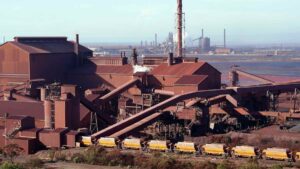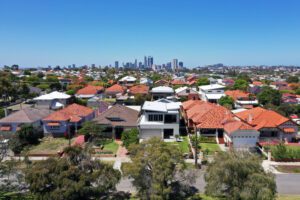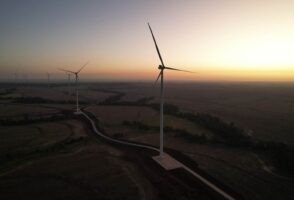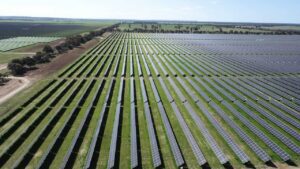Federal climate and energy minister Chris Bowen said efforts to lower the impact of fossil fuels on household and business energy bills will not derail the Labor government’s ambitious goal of reaching 82 per cent renewable energy by the end of the decade.
Labor’s mooted price caps on gas supplies, and possibly coal as well, have sparked concern from the fossil fuel lobby worried about the economics of new projects, from state governments worried about royalty income, and from clean energy investors worried that subsidised fossil fuels will slow the switch to renewables.
Bowen will meet state energy ministers on Thursday, ahead of the National Cabinet meeting of the PM and premiers that has been delayed from Wednesday to Friday because “the boss has got the bug” – prime minister Anthony Albanese has tested positive for Covid19 for the second time.
“The government has a short term imperative and a longer term mission,” Bowen told journalists in western Sydney, where the biggest electric truck purchase and trial in Australia was announced on Tuesday morning, including $20.1 million in funding from ARENA.
“The short term imperative is that it is in nobody’s best interest … to see Australian industries under pressure from rising energy prices, to see industries potentially close through no fault of their own, because gas and coal is so much more expensive than it was just last December,” Bowen said.
“So that needs to be dealt with in the short term. In no way does that in any way deviate the government from his medium and long term agenda of a renewable energy revolution.
“Because we need to do all the above. And in fact, this crisis is caused by coal and gas prices. Anybody who says it is caused by renewables is lying. And that needs to be called out.
“Renewables are the solution to this crisis, not the cause. And the government is not deviating for one moment from our agenda of 82% renewables in the grid by 2030.”
Those sentiments are echoed by the clean energy industry itself, which has recommended a basket of six policy initiatives that could facilitate the rollout of renewables, including reforms on the connections process, an energy storage target, and avoid distortions to the market such as the government intervention contemplated by Labor.
Tristan Edis, from Green Energy Markets, says a better option than price caps would be some kind of export tariff or levy, which would allow governments to collect a high proportion of the revenue for exported coal and gas sales (say over 70 per cent) once the price rose above a certain very high price.
“We need to become more efficient and use less coal and gas if we are to achieve emission reduction goals,” Edis says.
“The revenue raised by government (through an export tariff) could then be returned to households and businesses through a combination of straight cash payments, and also subsidies for equipment upgrades that would help reduce consumers’ need for fossil fuel energy.
“Unfortunately it seems that the Labor Government will pursue price caps, because they are scared of another mining tax scare campaign.
“That’s a real pity because consumers would be better off if they were given the option of reducing their consumption and pocketing any extra cash, rather than just being offered subsidised coal and gas.
“In the end I think the general public are smart enough to work out that this windfall tax is going to leave them better off and coal and gas producers are still making plenty of profit irrespective of their chicken little claims.”
Bowen says the government will target “necessary and carefully designed short term and temporary interventions”, but would not confirm the exact nature of those to be discussed on Friday.
Australia is currently at around 35 per cent renewables, and needs to accelerate rapidly to meet that 82 per cent reduction target. Many coal closures have been planned for coming years, but coal plant owners have signalled they may be required to operate for longer, and flagged the need for funding support on continued maintenance.
Those payments, which come under the general rubric of capacity payments, will likely be discussed by energy ministers this Thursday, although Bowen would not discuss what proposals had been put forward.
State ministers grew impatient with the Energy Security Board’s work on so-called capacity markets, concerned they would favour incumbent fossil fuel generators rather than encourage new entrant technologies such as battery storage and pumped hydro.
The state’s have been working on their own alternatives, but in reality each state has its own view about how the need for storage should be managed.
But the question about coal, and how to ensure they do not close too early, and before new infrastructure is built, will not go away. Some states have signed individual deals with generators, such as Victoria with Yallourn and South Australia with Torrens B, but a central mechanism – such as exit auctions – is being pursued.










